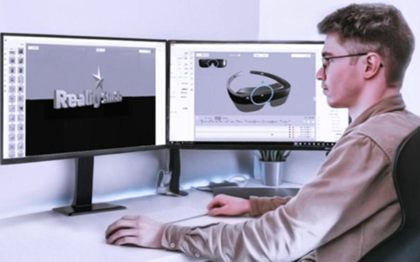With the continuous development
of technology, people's curiosity about the reality app is becoming stronger and they are
also eager to know in which fields it plays an important role. This application
can change people's perception of the surrounding environment and provide a
brand new experience of interacting with the real world. So the following
article will explain in detail in which areas it plays an important role.
Four Useful Areas
Entertainment Sector
Firstly, real-world applications
have played an important role in the entertainment industry. The role of
Reality apps in the entertainment industry is to bring users from the real
world into an immersive digital experience through virtual reality or augmented
reality technology. They will provide new dimensions and interactive ways for
games. Users can participate in games in the virtual world and enjoy a more
immersive experience by wearing VR helmets or using AR devices. This immersive
experience can increase the fun and excitement of your gaming experience. In
addition, these apps can simulate various locations and scenarios, allowing
users to personally experience places that cannot be reached personally.

For example, users can use VR
helmets at home to explore scenic spots, scenic spots, and cultural heritage
from around the world, as well as visit virtual museums and exhibitions.
Moreover, with the help of reality apps, artists and creators can utilize virtual
reality and augmented reality technologies to create unique and stunning
artworks and creative works. Users can also interact with artworks through
these applications, exploring different art forms and styles.

Simply put, you can imagine that
when you open a real application, you can create a virtual game scene at home
or in the park and play games with friends. You can choose different game
themes, from chasing treasures to solving puzzles, and embark on an exciting
adventure with friends. Real application programs can also be combined with
media content such as movies and TV programs to bring viewers a more immersive
entertainment experience.
Education Sector
Real applications are also widely
used in the fields of education and training. For example, when studying
science courses, real-life applications can overlay virtual elements such as
models and charts into a laboratory environment, enabling students to better
understand abstract theoretical concepts. In addition, real-world applications
can also be used to simulate vocational training, such as pilots, doctors, etc.
Students can engage in virtual practice through real-life applications and gain
experience in real environments in advance.
Business Sector
Real applications also have great
potential in the commercial and retail fields. Through real-life applications,
consumers can use their phones or other devices to overlay virtual products
into their homes before shopping, in order to better understand the details of
product size, color, and so on. This shopping experience is not only
convenient, but also helps consumers make more informed purchasing decisions.
In addition, some retailers have started using real-world applications to
create virtual fitting rooms, allowing consumers to try out clothing online, and
avoiding the hassle of traditional fitting processes.

Health Sector
Finally, real-world applications
still play an important role in the healthcare field. Doctors can use
real-world applications for case analysis and surgical simulation to improve
accuracy and safety. At the same time, patients can also undergo rehabilitation
training and monitor their health status through real-life applications. This
provides more personalized and efficient solutions for healthcare.
Summary
In summary, real-world
applications have brought us many new experiences and opportunities. Whether in
the fields of entertainment, education, business, or healthcare, real-world
applications play an important role. With the continuous progress of technology,
it is believed that real-world applications will continue to create more
amazing possibilities and change the way people interact with the world.
